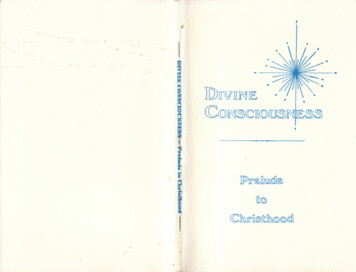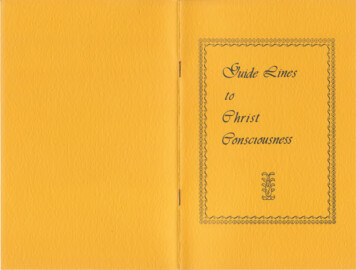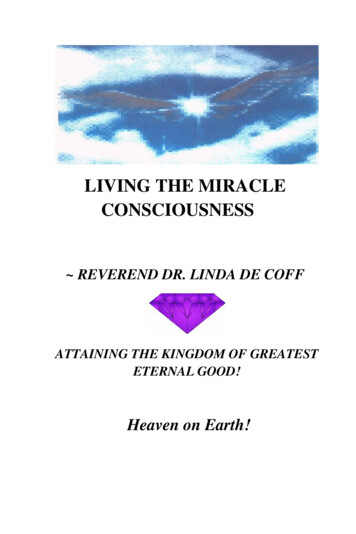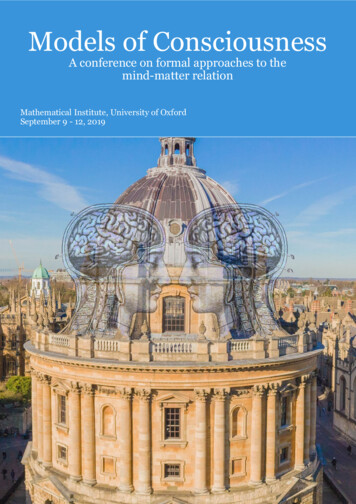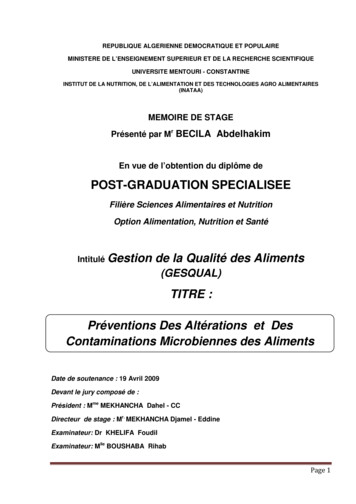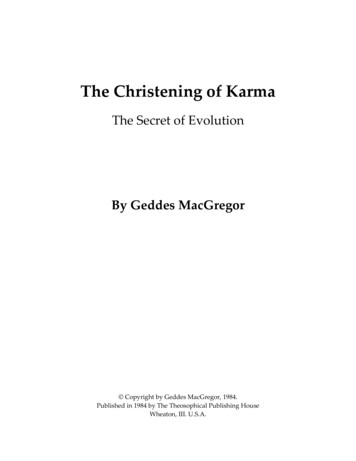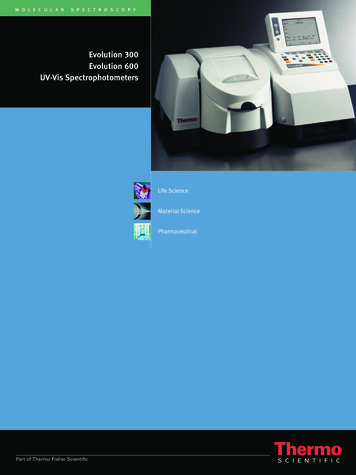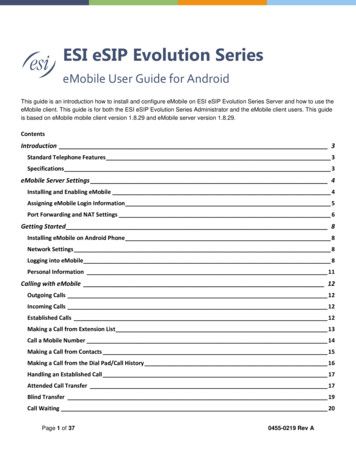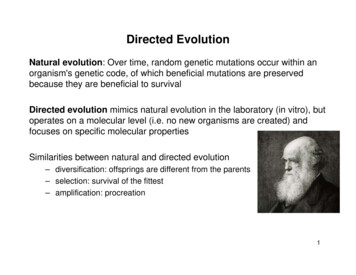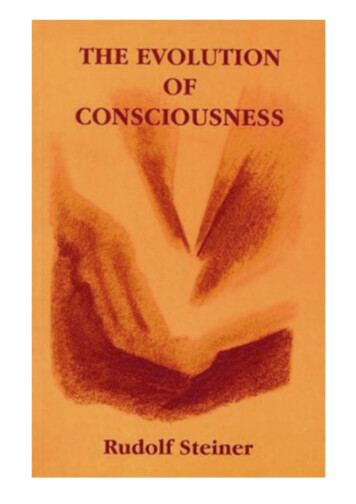
Transcription
Title:The Evolution of ConsciousnessAuthor:Rudolf SteinerPublisher:Rudolf Steiner PressTranslation:Translated by Violet E. Watkin and Charles DavyYear Publ:1966 ISBN/LCN:None Pages:198 Type:HardcoverSize:5 1/2 x 8 1/2 inchesThe Evolution of Consciousnessas revealed through Initiation-KnowledgeBy Rudolf SteinerTranslated by Violet E. Watkin and Charles DavyGA 227In these comprehensive lectures, given to an English audience, Rudolf Steiner explains how it is possible to develop higher faculties ofconsciousness — Imagination, Inspiration, and Intuition. A particularly vivid description is given of one's life after death and the progress ofthe individual through the planetary spheres where tasks and goals for future incarnations are prepared in cooperation with the spiritualbeings of the Hierarchies. The lectures culminate in the call for humanity to gradually take in hand its own destiny through the conscious andfree development of spiritual capacities.Evolution of Consciousness consists of thirteen lectures given at Penmaenmawr, Wales in August of 1923. They were published in Germanas, Initiations-erkenntnis. Die geistige und physische Welt- und menschheitsentwickelung in der Vergangenheit, Gegenwart und Zukunft vomGeistespunkt der Anthroposophie, and are presented here with the kind permission of the Rudolf Steiner Nachlassverwaltung, Dornach,Switzerland.Copyright 1966This e.Text edition is provided with the cooperation of:The Rudolf Steiner PressTHE EVOLUTION OFCONSCIOUSNESSas revealed through Initiation-KnowledgeThirteen lectures given atPenmaenmawr, North Wales19th to 31st August, 1923A new translation by V. E. W. and C. D.CONTENTSCover SheetContents2 of 68
Lecture I: First Steps towards Imaginative KnowledgeLecture II: Inspiration and IntuitionAugust 19,1923August 20,1923Lecture III: Initiation-Knowledge — New and OldAugust 21,1923Lecture IV: Dream LifeAugust 22,1923Lecture V: The Relation of Man to the Three WorldsLecture VI: The Ruling of Spirit in NatureAugust 23,1923August 24,1923Lecture The Interplay of various WorldsVII:August 25,1923Lecture During Sleep and after DeathVIII:August 26,1923Lecture IX: Experiences between Death and RebirthLecture X: Man's Life after Death in the Spiritual CosmosLecture XI: Experience of the World's PastAugust 27,1923August 28,1923August 29,1923Lecture The Evolution of the World in connection with the Evolution ofXII: ManAugust 30,1923Lecture The Entry of Man into the Era of FreedomXIII:August 31,1923Relevant LiteratureSummarized Plan or Complete Edition (ref.) of Rudolf Steiner'sWorksThe Evolution of ConsciousnessIFirst Steps towards ImaginativeKnowledgeThroughout the ages, understanding the world has been closely associated with understanding man himself. It isgenerally recognised that in the days when not only material existence, but also spiritual life, was taken intoconsideration, man was looked upon as a microcosm, as a world in miniature. This means that man in his being and3 of 68
doing, in the whole part he plays in the world, was viewed as a concentration of all the laws and activities of theCosmos. In those days it was insisted that understanding of the universe could be founded only on an understandingof man.But here, for anyone who is unprejudiced, a difficulty arises at once. Directly he wants to arrive at so-called selfknowledge — the only true knowledge of man — he finds himself confronted by an overwhelming riddle; and afterobserving himself for a time, he is obliged to own that this being of his, as it appears in the world of the senses, isnot completely revealed even to his own soul. He has to admit that for ordinary sense-perception part of his beingremains hidden and unknown. Thus he is faced with the task of extending his self-knowledge, of thoroughlyinvestigating his true being, before he can come to knowledge of the world.A simple reflection will show that a man's true being, his inner activity as an individual, cannot be found in theworld that holds good for his senses. For directly he passes through the gate of death, he is given over as a corpse tothe laws and conditions of this sense-perceptible world. The laws of nature — those laws which prevail out there inthe visible world — seize upon the physically dead man. Then that system of relationships, which we call thehuman organism, comes to an end; then, after a time depending upon the manner of his disposal, the physical mandisintegrates.From this simple reflection, therefore, we see that the sum of nature's laws, in so far as we come to know themthrough sense-observation, is adapted solely to breaking down the human organism and does nothing to build it up.So we have to look for those laws, for that other activity, which, during earthly life, from birth or conception todeath, fight against the forces, the laws, of dissolution. In every moment of our life we are engaged with our trueinward being in a battle with death.If now we look round at the only part of the sense-world understood by people today, the mineral, lifeless world,this certainly is subject to the forces that signify death for the human being. It is pure illusion for natural scientiststo think they could ever succeed, by relying on the laws of the external sense-world, in understanding even theplants. That will never be so. They will go some little way towards this understanding and may cherish it as anideal, but it will never be possible really to fathom the plant — let alone the animal and physical man himself —with the aid of the laws which belong to the external world perceived by man.As earthly beings, between conception and death, in our true inner being we are fighters against the laws of nature.And if we really want to rise to self-knowledge, we have to examine that activity in the human being which worksagainst death. Indeed, if we are to investigate thoroughly man's being — which is our intention in these lectures —we shall have to show how, through a man's earthly development, it comes about that his inner activities ultimatelysuccumb to death — how death gains the victory over the hidden forces opposing it.All this is intended to show the course our studies are meant to take. For the truth of what I am now saying will berevealed only gradually in the various lectures. To begin with, therefore, we can merely indicate, by observing manwithout prejudice, where we have to look for his innermost being, for his personality, his individuality. This is notto be found within the realm of natural forces, but outside it.There is, however, another indication — and such indications are all I want to give to-day — that as earthly menwe live always in the present moment. Here, too, we need only be sufficiently unprejudiced to grasp all that thisstatement implies. When we see, hear, or otherwise perceive through our senses, it is the actual moment that is allimportant for us. Whatever has to do with the past or the future can make no impression on our ears, our eyes, or onany other sense. We are given up to the moment, and thereby to space.But what would a man become were he entirely given up to the present moment and to space? By observingordinary life around us we have ample proof that, if a man is thus completely engrossed, he is no longer man in thefull sense. Records of illness give evidence of this. Well-authenticated cases can be quoted of persons who, at acertain time in their lives, become unable to remember any of their former experiences, and are conscious only ofthe immediate present. Then they do the craziest things. Contrary to their ordinary habits, they buy a railway ticketand travel to some place or other, doing everything necessary at the time quite sensibly, with more intelligence, andperhaps with more cunning, than usual. They have meals and do all the other little things in life at the normal time.On arrival at the station to which they booked, they take another ticket, going possibly in an opposite direction.They wander about in this way, it may be for years, until they come to a stop at some place, suddenly realising theydon't know where they are. Everything they have done, from the moment they took the first ticket, or left theirhome, is blotted out from their consciousness, and they remember only what took place before that. Their life ofsoul, the whole of their life as human beings on earth, becomes chaotic. They no longer feel themselves to be aunified person. They had always lived in the present moment and had been able to find their way about in space,but now they have lost their inner feeling for time; they have lost their memory.4 of 68
When a man loses his inner feeling for time — his really intimate connection with the past — then his life becomesa chaos. Experience of space alone can do nothing to help towards the health of his whole being.To put this in other words: A man in his sense-life is always given up to the moment, and in some cases of illness itis possible for him to detach his immediate existence in space from his existence as a whole — but he is then nolonger man in the full sense.Here we have an indication of something in man belonging not to space but only to time; and we must say that ifone human experience is that of space, there is also another which must always be present in a man — theexperience of time. For him to remain man in the full sense, memory must make the past present in him. Beingpresent in time is something indispensable for a man. Past time, however, is never there in the present moment; toexperience it we must always carry it over into the present. Therefore in a human being there must be forces forconserving the past, forces that do not arise out of space and are therefore not to be understood as laws of natureworking spatially, for they are outside space.These indications point to the fact that if a man is to be the central point of knowledge of the world and has tobegin by knowing himself, he must seek first of all within his own being for that which can raise him above spatialexistence — the sole existence of which the senses tell — and can make him a being of time in the midst of hisspatial existence. Therefore, if he is to perceive his own being, he must summon up from within himself cognitionalpowers which are not bound up with his senses or his perception of space. It is at this particular stage of humanevolution, when natural science is having so momentous an effort in focussing attention on the laws of space, that,for reasons to be shown in these lectures, the true being of man has in general been entirely lost to view. Hence it isparticularly necessary now to point out the inner experiences which, as you have seen, lead a man out of space intotime and its experiences. We shall see how, going on from there, he actually enters the spiritual world.The knowledge leading over from the world of the senses to the supersensible has been called, throughout the ages,Initiation-knowledge — knowledge, that is, of what constitutes the true impulse, the active element, of humanpersonality. It is of this Initiation-knowledge that I have to speak in these lectures, as far as is possible today. Forour intention is to study the evolution of the world and of man, in the past, present and future, in the light ofInitiation-knowledge.I shall therefore have to begin by speaking of how such Initiation-knowledge can be acquired. The very way inwhich these matters are spoken of to-day clearly distinguishes present Initiation-knowledge from that of the past. Inthe past, individual teachers wrestled their way through to a perception of the supersensible in the world and inman. On the feelings of the students who came to them they made a strong impression by dint of their purelyhuman qualities, and the students accepted the knowledge they offered, not under any compulsion, but in responseto the teacher's personal authority.Hence, for the whole of man's evolution up to the present time, you will always find described how there wereseparate groups of pupils, each under the guidance of a teacher, a “guru”, to whose authority they submitted. Evenon this point — as on many others we shall come across in these lectures — Initiation-knowledge to-day cannotfollow the old path. The “guru” never spoke of the path by which he had achieved his own knowledge, and in thosebygone times public instruction about the road to higher knowledge was never even considered. Such studies werepursued solely in the Mystery-centres which in those days served as universities for those following a supersensiblepath.In the view of the general level of human consciousness which has been reached at this moment in history, such apath would no longer be possible. Anyone speaking of supersensible knowledge to-day is therefore naturallyexpected to say at once how this knowledge is to be acquired. At the same time everyone must be left free todecide, in accordance with his own way of life, his attitude to those exercises for body, soul and spirit, throughwhich certain forces within man are developed. These forces look beyond the laws of nature, beyond the presentmoment, into the true being of the world, and therewith into the true being of man himself. Hence the obviouscourse for our studies is to begin with at least a few preliminary remarks about the way by which a man to-day canacquire knowledge of the supersensible.We must thus take our start from man as he really is in earthly existence, in relation to space and the presentmoment. As an earthly being a man embraces in his soul and bodily nature — I say deliberately soul and bodilynature — a triad: a thinking being, a feeling being and a being of will. And when we look at everything that lies inthe realm of thinking, in the realm of feeling and in that of the will, we have seen all of the human being that takespart in earthly existence.Let us look first at the most important factor in man through which he takes his place in earthly existence. This iscertainly his thinking. To his thinking nature he owes the clear-headedness he needs, as earthly man, for surveying5 of 68
the world. In comparison with this lucid thinking, his feeling is obscure, and, as for his willing — those depths ofhis being from which the will surges up — all that, for ordinary observation, is entirely out of range.Just think how small a part your will plays in the ordinary world and in ordinary experience. Say you make up yourmind to move a chair. You first have the thought of carrying it from one spot to another. You have a concept of this.The concept then passes, in a way you know nothing of, right into your blood and muscles. And what goes on inyour blood and muscles — and also in your nerves — while you are lifting the chair and carrying it elsewhere,exists for you only as an idea. The real inner activity that goes on within your skin — of that you are whollyunconscious. Only the result comes into your thought.Thus, of all your activities when awake, the will is the most unconscious. We will speak later of activity duringsleep. During waking activity the will remains in absolute obscurity; a person knows as little about the passing ofhis thought into willing as in ordinary life on Earth he knows of what happens between falling asleep and waking.Even when anyone is awake, he is asleep where the inner nature of the will is concerned. It is only the faculty offorming concepts, of thinking, that enters clearly into man's life on Earth. Feeling lies midway between thinkingand willing. And just as the dream stands between sleeping and waking, as an indefinite, chaotic conception, halfasleep, half-awake, so, coming halfway between willing and thinking, feeling is really a waking dream of the soul.We must take the clarity of thinking as our starting-point; but how does thinking run its course in ordinary life onEarth?In the whole life of a human being on Earth, thinking plays a quite passive role. Let us be perfectly honest aboutthis when observing ourselves. From the moment of waking until going to sleep a man is preoccupied with theaffairs of the outer world. He lets sense-impressions flow into him, and with them concepts are then united. Whensense-impressions pass away, only representations of them remain in the soul, turning gradually into memories.But, as I have said, if as earthly beings we observe ourselves honestly, we must admit that in concepts gained fromordinary life there is nothing which has not come into the soul from the external world through the senses. Ifwithout prejudice we examine what we carry deep down in our souls, we shall always find it was occasioned bysome impression from without.This applies particularly to the illusions of those mystics who — I am saying this expressly — do not penetrate toany great depth. They believe that by means of a more or less nebulous spiritual training they can come to aninward experience of a higher divinity underlying the world. And these mystics, these half or quarter mystics, areoften heard to say how an inner light of the soul has dawned within them, how they have had some kind of spiritualvision.Anyone who observes himself closely and honestly will come to see that many mystical visions can be traced tomerely external sense-experiences which have been transformed in the course of time. Strange as it may seem, it ispossible for some mystic, at the age perhaps of forty, to think he has had a direct, imaginative impression, a vision,of — we will take something concrete — the Mystery of Golgotha, that he sees the Mystery of Golgotha inwardly,spiritually. This gives him a feeling of great exaltation. Now a really good psychologist, who can go back throughthis mystic's earthly life, may find that as a boy of ten he was taken by his father on a visit, where he saw a certainlittle picture. It was a picture of the Mystery of Golgotha, and at the time it made hardly any impression on his soul.But the impression remained, and in a changed form sank deep down into his soul, to rise up in his fortieth year asa great mystical experience.This is something to be stressed particularly when anyone ventures, more or less publicly, to say anything about thepaths to supersensible knowledge. Those who do not take the matter very seriously generally talk in a superficialway. It is just those who wish to have the right to speak about mystical, supersensible paths who ought to knowabout the errors in this sphere which can lead people astray. They ought fully to realise that ordinary selfknowledge is chiefly made up of transformed external impressions, and that genuine self-knowledge must besought to-day through inner development, by calling up forces in the soul not previously there. This requires us torealise the passive nature of our usual thinking. It deals with all impressions in the way natural to the senses. Theearlier things come first, the later ones later; what is uppermost in thought remains above; what is below remainsbelow. As a rule, therefore — not only in ordinary life but also in science — a man's concepts merely trail afterprocesses in the external world. Our science has gone so far as to make an ideal of discovering how things run theircourse in the external world without letting thinking have the slightest influence on them. In their own sphere thescientists are quite right; by following this method they have made enormous advances. But they are more andmore losing sight of man's true being. For the first step in those methods for developing inner forces of the soulleading to supersensible cognition, called by us meditation and concentration, is by finding the way over frompurely passive thinking to thinking that is inwardly active.I will begin by describing this first step in a quite elementary way. Instead of a concept aroused by somethingexternal, we can take a concept drawn entirely from within and give it the central place in our consciousness. Whatis important is not that the concept should correspond to a reality, but that it should be drawn up out of the depths6 of 68
of the soul as something active. Hence it is not good to take anything we remember, for in memory all manner ofvague impressions cling to our concepts. If, therefore, we draw upon our memory we shall neither be sure that weare not letting extraneous things creep in, nor sure that we have really set about meditating with proper inwardactivity. There are three possible ways of proceeding, and there need be no loss of independence on any of them. Asimple, easily apprehended concept is preferable, a creation of the moment, not having anything to do with what isremembered. For our purpose it can even be something quite paradoxical, deliberately removed from any passivelyreceived idea. We have only to make sure that the meditation has been brought about through our own inneractivity.The second way is to go to someone with experience in this sphere and ask him to suggest a subject for meditation.There may then be fear of becoming dependent on him. If, however, from the moment the meditation is received,one is conscious that every step has been taken independently, through an inner activity of one's own, and that theonly thing not determined by oneself is the subject, which, since it comes from someone else, has to be actively laidhold of — when one is conscious of all this, there is no longer any question of dependence. It is then particularlynecessary to continue to act in full consciousness.And finally, the third way. Instruction can be sought from a teacher who — one might say — remains invisible. Thestudent takes a book he has never seen before, opens it at random and reads any chance sentence. He can thus besure of coming on something entirely new to him, and then he must work on it with inner activity. A subject formeditation can be made of the sentence, or perhaps of some illustration or diagram in the book, so long as he iscertain he has never previously come across it. That is the third method, and in this way a teacher can be createdout of nothing. The book has to be found and looked at, and a sentence, a drawing, or anything else chosen from it— all this constitutes the teacher.Hence it is perfectly possible nowadays to take the path to higher knowledge in such a way that the active thinkingrequired will not be unjustifiably encroached on by any other power. This is essential for present-day mankind. Inthe course of these lectures we shall see how necessary it is for people to-day, especially when they wish to makeprogress on the path to higher worlds, to respect and treasure their own free will. For how, otherwise, is any inneractivity to be developed? Directly anyone becomes dependent on someone else, his own will is frustrated. And it isimportant that meditation to-day should be carried through with inner activity, out of the will in thinking, which ishardly at all valued to-day, with modern science putting all the emphasis on passive observation of the outer world.In this way we can win through to active thinking, the rate of progress depending wholly on the individual. Oneman will get there in three weeks, if he perseveres with the same exercises. Another will take five years, anotherseven, and someone else nineteen, and so on. The essential point is that he should never relax his efforts. A momentwill come when he recognises that his thinking has really changed: it no longer runs on in the old passive picturesbut is inwardly full of energy — a force which, although he experiences it quite clearly, he knows to be just asmuch a force as the force required to raise an arm or point a finger. We come to know a thinking that seems tosustain our whole being, a thinking that can hit against an obstacle. This is no figure of speech, but a concrete truththat we can experience. We know that ordinary thinking does no such thing. When I run up against a wall and gethurt, my physical body has received a blow through force of contact. This force of contact depends on my beingable to hit my body against objects. It is I who do the hitting. The ordinary passive thinking does not hit anything,but simply presents itself to be hit, for it has no reality; it is only a picture. But the thinking to which we come inthe way described is a reality, something in which we live. It can hit against something as a finger can hit the wall.And just as we know that our finger cannot go through the wall, so we know that with this real thinking we cannotfathom everything. It is a first step. We have to take this step, this turning of one's own active thinking into anorgan of touch for the soul, so that we may feel ourselves thinking in the same way that we walk, grasp or touch; sothat we know we are living in a real being, not just in ordinary thinking which merely creates images, but in areality, in the soul's organ of touch which we ourselves have become.That is the first step — to change our thinking so that we feel: Now you yourself have become the thinker. Thatrounds off everything. With this thinking it is not the same as with physical touch. An arm, for instance, grows aswe grow, so that when we are full-grown our proportions remain correct. But the thinking that has become active islike a snail — able to extend feelers or to draw them in again. In this thinking we live in a being certainly full offorce but inwardly mobile, moving backwards and forwards, inwardly active. With this far-reaching organ of touchwe can — as we shall see — feel about in the spiritual world; or, if this is spiritually painful, draw back.All this must certainly be taken seriously by those with any desire to approach the true being of man — thistransformation of one's whole nature. For we do not discover what a man actually is unless we start by seeing inhim something beyond what is perceived by our earthly senses. All that is developed through the activity ofthinking is a man's first supersensible member — later I shall be describing it more fully. First we have man'sphysical body that can be perceived by our ordinary sense-organs, and this offers resistance on meeting theordinary organs of touch. Then we have our first supersensible member — we can call it the etheric body or theformative forces body. It must be called something, but the name is immaterial. In future I will call it the etheric or7 of 68
formative forces body. Here we have our first supersensible member, just as perceptible for a higher power oftouching, into which thinking has been changed, as physical things are perceptible to the physical sense of touch.Thinking becomes a supersensible touching, and through this supersensible touching the etheric or formative forcesbody can be, in the higher sense, both grasped and seen. This is the first real step, as it were, into the supersensibleworld.From the very way in which I have tried to describe the passing over of thinking into the experience of an actualforce within one, you will realise how little sense there is, where genuine spiritual development is concerned, insaying, for example, that anyone who wishes to enter the spiritual world by this path is merely indulging in fantasyor yielding to auto-suggestion. For it is the first reaction of many people to say: “Anyone who talks of the higherworlds in connection with a training of this kind is simply picturing what he has suggested to himself.” Then otherstake up the refrain, perhaps saying: “It is even possible that someone who loves lemonade has only to think of itand his mouth immediately begins to water, just as though he were drinking lemonade. Auto-suggestion has suchpower!”All this may certainly be so, and anyone who is taking the rightful path we have indicated into the spiritual worldmust be well up in the things that physiologists and psychologists can get to know intellectually, and he shouldhave a thoroughly practical acquaintance with the precautions that have to be observed. But to anyone who believeshe can persuade himself by auto-suggestion that he is drinking lemonade, although he has none, I would reply:“Yes, that is possible — but show me the man who has quenched a real thirst with imaginary, auto-suggestedlemonade!” That is where the difference begins between what is merely imagined passively and what is actuallyexperienced. By keeping in touch with the real world and making our thinking active, we reach the stage of livingspiritually in the world in such a way that thinking develops into a touching. Naturally it is a touching that hasnothing to do with chairs or tables; but we learn to touch in the spiritual world, to make contact with it, to enter intoa living relation with it. It is precisely by means of this active thinking that we learn to distinguish between themystical fancies of auto-suggestion and the experience of spiritual reality.All these objections arise from people not having yet looked into the way modern Initiation-knowledge describesthe path for to-day. They are content to judge from outside a matter of which they may have heard simply the name,or of which they have gained a little superficial knowledge. Those who enter the spiritual world in the way heredescribed, which enables them to make contact with it and to touch it, know how to distinguish between merelyforming a subsequent concept of what they have experienced through active thinking and the perceptive experienceitself. In ordinary life we can quite well distinguish between the experience of inadvertently burning our finger anda picturing of the incident afterwards! There is a most convincing difference, for in one case the finger is actuallypainful, in the other it is painful only in imagination. The same difference is encountered on a higher level betweenideas we have of the spiritual world and what we actually experience there.Now the first thing attained in this way is true self-knowledge. For, just as in life we have for our immediateperception a table here, chairs over there, and this whole splendid hall — with the clock
The Evolution of Consciousness as revealed through Initiation-Knowledge By Rudolf Steiner Translated by Violet E. Watkin and Charles Davy GA 227 In these comprehensive lectures, given to an English audience, Rudolf Steiner explains how it is possible to develop higher faculties of consciou


